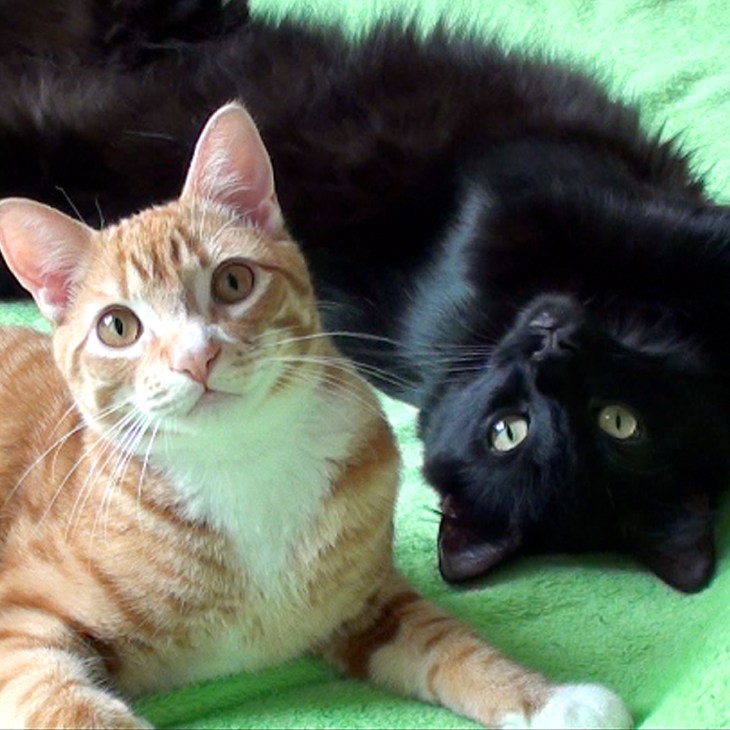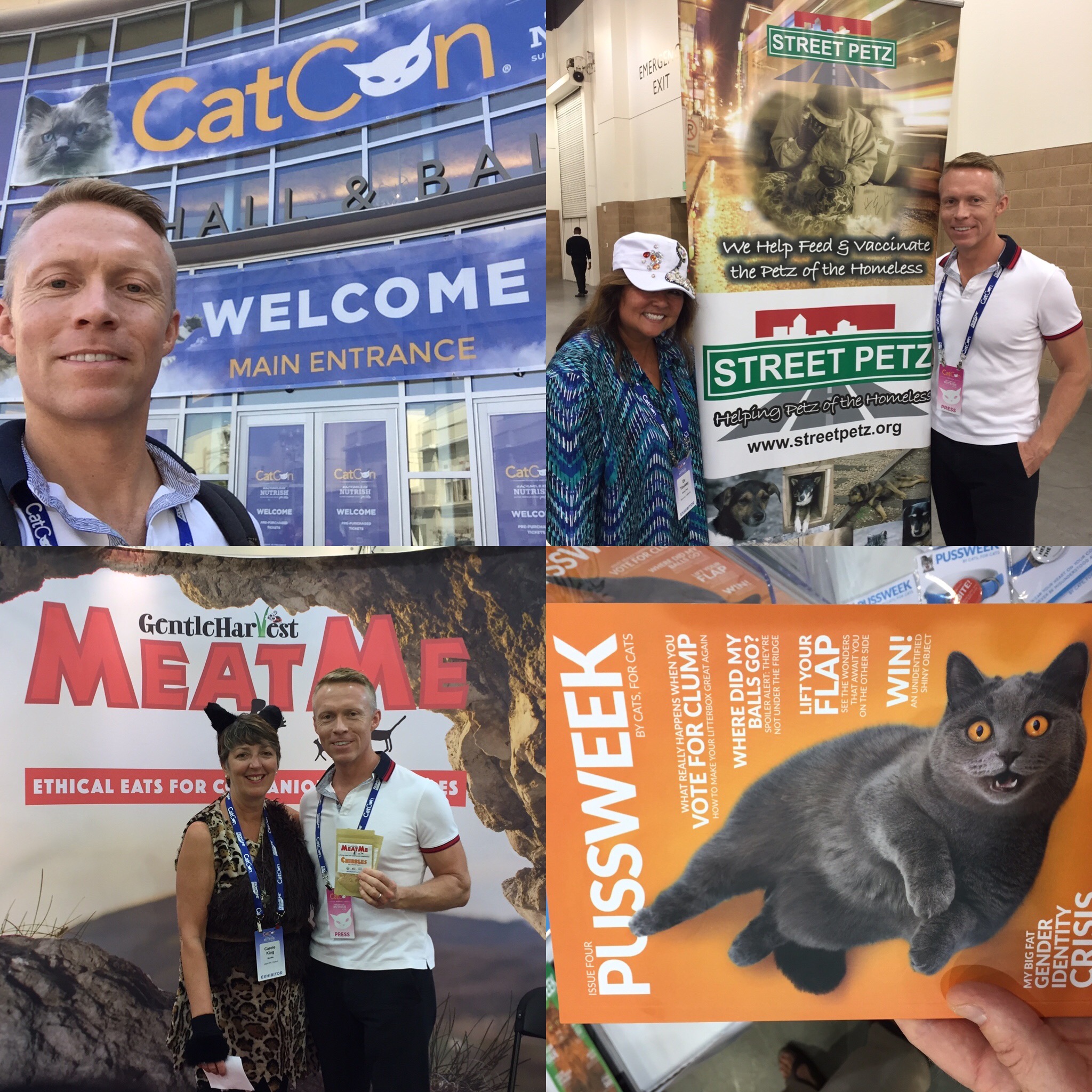 Photo credit coleandmarmalade.com
In case you missed it, the 3rd annual CatCon LA recently occurred in Pasadena, CA.
This year’s event brought together a variety of people all having the shared interest in the love of all things feline along with a celebrity cats (Lil’ Bub, Pudge, etc.) and humans (Julie Newmar, Jackson Galaxy, Ian Somerhalder, etc.) for a weekend filled with motivational talks, intriguing films, novel products, networking and selfie opportunities, and more.
There were so many sights and sounds to take in over the weekend, but my personal highlights included catching up with my pals Dr. Yukiko Kuwahara of Street Pets and Carole King of MeatMePetFood and having the opportunity to interview Chris Poole, the human attached to the notorious feline duo Cole and Marmalade.
I was intrigued to get to know more about Cole and Marmalade, since Marmalade has quite the intriguing story of overcoming and living with life-threatening disease. Marmalade is a cat having Feline Immunodeficiency Virus (FIV), which means he is infected with a virus that suppresses his immune system and can cause an AIDS-like syndrome (saying Marmalade has “feline AIDS” is not appropriate terminology). As a result of being immunosuppressed, FIV positive cats are prone to developing a variety other ailments, including cancer, which Marmalade also has overcome.
Let’s get on with the interview.
1. How is Marmalade’s health in the face of his FIV and cancer diagnoses?
Marmalade is reportedly “doing great and having regular checkups.” He gets three to four blood draws a year to assess his organ-system function and regular abdominal ultrasounds to look for signs of cancer recurrence.
In terms of being aware of his feline friend’s illness, Poole “did not know Marmalade was FIV positive when he was first adopted.” Marmalade had history of testing negative for FIV, so Poole “thought Marmalade was a healthy cat.” How Marmalade ended up becoming infected with FIV is unknown.
The clinical signs Marmalade was sick were not immediately evident, although Poole states “he’s always been a puker.” In attempt to remedy the issue Poole smartly raised the level of Marmalade’s food bowl and fed smaller volumes at each meal. When Poole, his wife, and Marmalade moved to California from Florida Marmalade started having more frequent vomiting, so he had an examination with a veterinarian and part of his diagnostic workup included blood testing which revealed the positive FIV result.
2. ColeandMarmalade.com indicates Marmalade had a tumor removed. When was the tumor diagnosed, where was the tumor located, and what was the biopsy result?
Marmalade’s cancer was diagnosed in 2014. As a result of his FIV infection Marmalade came down with lymphoma, a type of white blood cell cancer, early on in life. FIV negative cats tend to develop lymphoma later in life.
Marmalade’s lymphoma reportedly manifested as a tumor affecting his small intestine and preventing his digestive tract from properly moving fluid and food from the stomach to the large intestine (colon). This is a comparable course of illness to that which my dog Cardiff endured (see How a Vet Diagnoses and Treats Cancer in His Own Dog and a more unusual presentation than the visible and palpable swollen external lymph nodes which affect most pets having lymphoma.
Poole credits “moving to CA for saving Marmalade’s life” as Poole was job hunting, around the house more, and better able to notice that Marmalade was vomiting with increased frequency. After his initial veterinary assessment, Marmalade had further diagnostics, surgery, and chemotherapy treatment at Veterinary Specialty & Emergency Hospital San Diego(VSHSD).
Marmalade also pursued a holistic complement to Marmalade’s care by working with Holistic veterinarian, Dr. Carmine Bausone, of VCA Acacia Animal Hospital and Pet Resort Center, who prescribed:
Photo credit coleandmarmalade.com
In case you missed it, the 3rd annual CatCon LA recently occurred in Pasadena, CA.
This year’s event brought together a variety of people all having the shared interest in the love of all things feline along with a celebrity cats (Lil’ Bub, Pudge, etc.) and humans (Julie Newmar, Jackson Galaxy, Ian Somerhalder, etc.) for a weekend filled with motivational talks, intriguing films, novel products, networking and selfie opportunities, and more.
There were so many sights and sounds to take in over the weekend, but my personal highlights included catching up with my pals Dr. Yukiko Kuwahara of Street Pets and Carole King of MeatMePetFood and having the opportunity to interview Chris Poole, the human attached to the notorious feline duo Cole and Marmalade.
I was intrigued to get to know more about Cole and Marmalade, since Marmalade has quite the intriguing story of overcoming and living with life-threatening disease. Marmalade is a cat having Feline Immunodeficiency Virus (FIV), which means he is infected with a virus that suppresses his immune system and can cause an AIDS-like syndrome (saying Marmalade has “feline AIDS” is not appropriate terminology). As a result of being immunosuppressed, FIV positive cats are prone to developing a variety other ailments, including cancer, which Marmalade also has overcome.
Let’s get on with the interview.
1. How is Marmalade’s health in the face of his FIV and cancer diagnoses?
Marmalade is reportedly “doing great and having regular checkups.” He gets three to four blood draws a year to assess his organ-system function and regular abdominal ultrasounds to look for signs of cancer recurrence.
In terms of being aware of his feline friend’s illness, Poole “did not know Marmalade was FIV positive when he was first adopted.” Marmalade had history of testing negative for FIV, so Poole “thought Marmalade was a healthy cat.” How Marmalade ended up becoming infected with FIV is unknown.
The clinical signs Marmalade was sick were not immediately evident, although Poole states “he’s always been a puker.” In attempt to remedy the issue Poole smartly raised the level of Marmalade’s food bowl and fed smaller volumes at each meal. When Poole, his wife, and Marmalade moved to California from Florida Marmalade started having more frequent vomiting, so he had an examination with a veterinarian and part of his diagnostic workup included blood testing which revealed the positive FIV result.
2. ColeandMarmalade.com indicates Marmalade had a tumor removed. When was the tumor diagnosed, where was the tumor located, and what was the biopsy result?
Marmalade’s cancer was diagnosed in 2014. As a result of his FIV infection Marmalade came down with lymphoma, a type of white blood cell cancer, early on in life. FIV negative cats tend to develop lymphoma later in life.
Marmalade’s lymphoma reportedly manifested as a tumor affecting his small intestine and preventing his digestive tract from properly moving fluid and food from the stomach to the large intestine (colon). This is a comparable course of illness to that which my dog Cardiff endured (see How a Vet Diagnoses and Treats Cancer in His Own Dog and a more unusual presentation than the visible and palpable swollen external lymph nodes which affect most pets having lymphoma.
Poole credits “moving to CA for saving Marmalade’s life” as Poole was job hunting, around the house more, and better able to notice that Marmalade was vomiting with increased frequency. After his initial veterinary assessment, Marmalade had further diagnostics, surgery, and chemotherapy treatment at Veterinary Specialty & Emergency Hospital San Diego(VSHSD).
Marmalade also pursued a holistic complement to Marmalade’s care by working with Holistic veterinarian, Dr. Carmine Bausone, of VCA Acacia Animal Hospital and Pet Resort Center, who prescribed:
- fish oil-based omega fatty acids- omega fatty acids have a natural anti-inflammatory effect and help prevent muscle wasting associated with cancer and other ailments
- L-Lysine- an amino acid that has antiviral properties to suppress replication of viruses and therefore may be of help to cats having FIV, feline herpes virus (FHV-1), etc.
- Mushroom powder- various mushrooms, including Maitake, Shiitake, and others, have immune system supportive effects
- Astragalus root powder- a plant extract having immune system supportive effects
Related Articles
 Attending CatCon 2017 in Pasadena, CA and catching up with my pals Dr. Yukiko Kuwahara of Street Petz and Carole King of Meat Me Pet Food
Attending CatCon 2017 in Pasadena, CA and catching up with my pals Dr. Yukiko Kuwahara of Street Petz and Carole King of Meat Me Pet Food
 Dr. Patrick Mahaney
Dr. Patrick Mahaney
Please leave your constructive perspective in the below Comments section and communicate with me and follow my adventures in veterinary medicine and life via Instagram (@PatrickMahaney), Twitter (@PatrickMahaney), and Facebook (Patrick Mahaney: Veterinarian Acupuncture Pain Management for Your Pets).
Copyright of this article (2017) is owned by Dr. Patrick Mahaney, Veterinarian, Certified Veterinary Acupuncturist, and Certified Veterinary Journalist. Republishing any portion of this article must first be authorized by Dr. Patrick Mahaney. Requests for republishing must be approved by Dr. Patrick Mahaney and received in written format.
